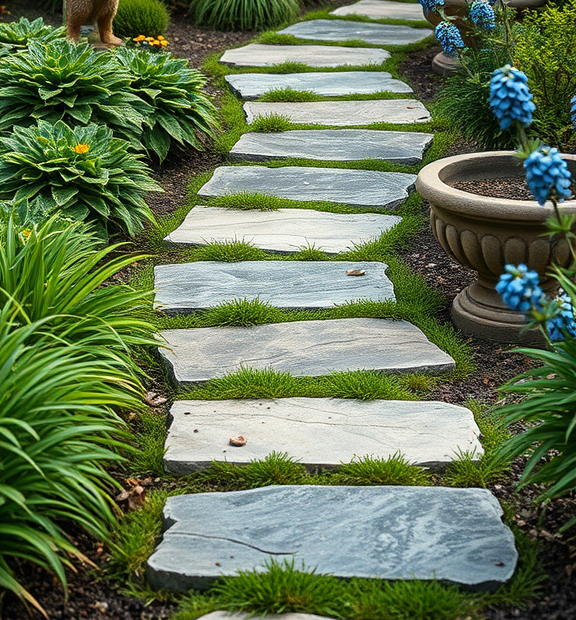Creative Ways to Design and Arrange Garden Stepping Stones
Are you looking to add charm and personality to your garden? Garden stepping stones can be an incredible way to create pathways, define spaces, and enhance the beauty of your outdoor area. With a little creativity, you can design and arrange these stones in numerous inventive ways. Let’s explore some creative design ideas that can transform your garden.
Choose Unique Materials
While traditional concrete stepping stones are a popular choice, don’t be afraid to explore other materials. Here are some ideas:
- Wooden Slabs: Use cut logs or reclaimed wood to give a rustic feel to your garden. Over time, they will blend beautifully with the surrounding soil.
- Natural Stone: various natural stones can add texture and color variations. Think about using flagstone or slate for a natural look.
- Glass or Mosaic: Colorful glass pieces or mosaic tiles can create stunning visual effects when arranged in a stepping stone layout.
Play with Shapes and Sizes
Experimenting with different shapes and sizes can make your pathway more visually interesting. Consider the following options:
- Random Sizes: Rather than uniform stones, mix large and small stones. This can create a whimsical, organic look.
- Shapes: Utilize stones in unique shapes—like circles, triangles, or hexagons. This can turn your pathway into a conversation starter.
- Layering: Create depth by layering stones of different heights. This adds interest and makes a more inviting path.
Incorporate Plants
Blending garden stepping stones with plants can create a magical outdoor space. Here’s how you can incorporate greenery:
- Succulent Gardens: Plant low-maintenance succulents around the stones to add pops of color without overwhelming the path.
- Moss: Plant moss in the gaps between stones for a soft, carpet-like effect. This brings a tranquil feel to your garden.
- Flower Borders: Surround your stepping stones with flowering plants. This can enhance both aesthetics and appeal to pollinators.
Design Patterns and Themes
Creating specific patterns or themes can guide visitors toward different parts of your garden. Consider the following tips:
- Curved Paths: Instead of straight paths, design winding curves with your stepping stones. This can create a sense of exploration.
- Color-Coded Paths: Use colored stones to define areas. For example, blue stones could lead to a water feature, while green stones might guide toward a seating area.
- Symbolic Designs: Arrange stones in a symbolic shape, like a heart or star. This adds a personal touch that reflects your personality.
Functional Arrangements
In addition to beauty, consider how your stones can serve a functional role in your garden. Some functional designs include:
- Gardening Paths: Create a clear path for walking through your vegetable or flower beds. This keeps soil intact and makes maintenance easier.
- Seating Areas: Use larger, flat stones as extra seating. You can create a little nook for relaxation among your greenery.
- Decorative Borders: Arrange stones around garden beds or flower pots to define spaces and prevent soil erosion.
Lighting Enhancements
Lighting can dramatically change the ambiance of your garden paths. Here are a few illuminating ideas:
- Solar Lights: Place small solar lights along the sides of your stepping stones to make your path visible at night.
- Embedded LED Lights: If you’re installing new stones, consider embedding LED lights within some of them. This adds a modern, enchanting touch.
- String Lights: Use string lights overhead in nearby trees to create a magical atmosphere where your stones shine below.
Love what I do? Be a hero and help me keep creating awesome content!
Support My Mission Now!Every donation fuels more great stuff – thank you, legend!
By applying these creative strategies to your garden stepping stones, you not only create beautiful designs but also elevate the overall experience of your outdoor space. Allow your imagination to flow and remember: every garden is a reflection of who you are. Get started on your stepping stone project, and watch your garden transform into a captivating oasis!
The Benefits of Using Eco-Friendly Materials for Stepping Stones in Your Garden
When designing your garden, think beyond traditional materials. Choosing eco-friendly materials for your garden stepping stones can bring beauty while also being kind to the environment. You don’t just make your outdoor space stunning; you also play a part in preserving nature.
Love what I do? Be a hero and help me keep creating awesome content!
Support My Mission Now!Every donation fuels more great stuff – thank you, legend!
Using eco-friendly materials for your stepping stones helps improve the overall health of the soil. Many types of natural stones, such as slate, flagstone, and river stones, are either biodegradable or sourced sustainably. This helps maintain the earth’s balance and enhances the life below the surface. Healthy soil is crucial for vibrant plants and a flourishing garden.
Another significant advantage of eco-friendly materials is their ability to blend seamlessly into the garden landscape. Natural stones often come in various shapes, sizes, and textures, which allows for creativity in design. For example, you can arrange them in a casual, rustic manner, or opt for a more structured layout, depending on your preference. The unique colors and textures will not only create an appealing pathway but will also complement the surrounding plants, making your garden feel cohesive and inviting.
Using sustainable materials also means you are likely to reduce your carbon footprint. Many recycled options are available, such as reclaimed bricks, concrete, and glass. These materials have often been repurposed from previous projects, diverting waste from landfills. By opting for recycled stepping stones, you play a crucial role in reducing the demand for new resources, which is a vital step in promoting sustainability.
Love what I do? Be a hero and help me keep creating awesome content!
Support My Mission Now!Every donation fuels more great stuff – thank you, legend!
Eco-friendly stepping stones can also lead to lower maintenance costs over time. Natural materials tend to be more durable compared to synthetic alternatives. They can withstand the elements—rain, heat, or frost—without cracking or fading. You may save money in the long run, as you will not need to replace them as frequently, and this minimizes waste.
Here are some popular eco-friendly materials to consider:
- Natural Stone: Options like granite, sandstone, or limestone are not only aesthetically pleasing but also eco-friendly.
- Reclaimed Wood: This can give your garden a warm, rustic feel. It blends beautifully with natural elements.
- Recycled Concrete: This is an economical choice and available in various shapes and designs.
- Compressed Earth Blocks: Innovatively made, these blocks are excellent for a natural look and durability.
- Bamboo: An entirely sustainable option, bamboo stepping stones add a unique flair to your garden.
Love what I do? Be a hero and help me keep creating awesome content!
Support My Mission Now!Every donation fuels more great stuff – thank you, legend!
Furthermore, the use of eco-friendly materials encourages biodiversity in your garden. By selecting stones that allow water to pass through, you promote healthy drainage and minimize puddling. This not only benefits the plants but also attracts beneficial insects, like butterflies and bees, which pollinate flowers. A more diverse ecosystem ensures your garden remains vibrant and thriving.
By choosing these innovatively designed stepping stones, you also create a conscious connection between the beauty of your garden and the preservation of the environment. Imagine a pathway made of smooth river stones guiding you through lush greenery, or reclaimed bricks that tell a story of their own. These materials often evoke feelings of nostalgia and warmth, adding personality to your outdoor space.
Using eco-friendly materials can spark conversations among visitors. When friends and family see your beautiful garden pathways, their interest in sustainable practices may increase. You may inspire others to make more eco-conscious choices in their own homes, which can create a ripple effect, encouraging sustainability in your community.
Ultimately, incorporating eco-friendly stepping stones into your garden design not only enhances the overall look and feel of your outdoor space but also supports environmental well-being. With various beautiful and sustainable options available, you can create a pathway that’s not only practical but also a reflection of your values when it comes to caring for our planet.
Conclusion
Designing and arranging garden stepping stones offers endless possibilities for enhancing your outdoor space. By exploring creative layouts—such as curvy paths, geometric designs, or even themed arrangements—you can transform an ordinary garden into a visual delight. Remember that the arrangement can influence not just aesthetics but also how comfortably you navigate your landscape, fostering a harmonious interaction between nature and design.
Additionally, choosing eco-friendly materials for your stepping stones is a choice that resonates deeply with both the environment and your local ecosystem. Options like recycled glass, natural stone, or even homemade concrete mixes not only minimize your carbon footprint but also contribute to sustainable gardening practices. These materials can withstand the elements and can often be sourced locally, reducing the energy used in transportation and production.
Merging creativity with sustainability leads to a garden that is not only beautiful but also mindful of the planet. This combination encourages you to engage with your surroundings and appreciate the beauty of nature while making responsible choices. So, whether you’re laying your stones in a fun, patterned path or opting for environmentally-friendly choices, you’re sure to create a space that invites exploration, relaxation, and enjoyment. Embrace the process, get inspired, and let your garden stepping stones reflect your unique style and commitment to ecological health.

